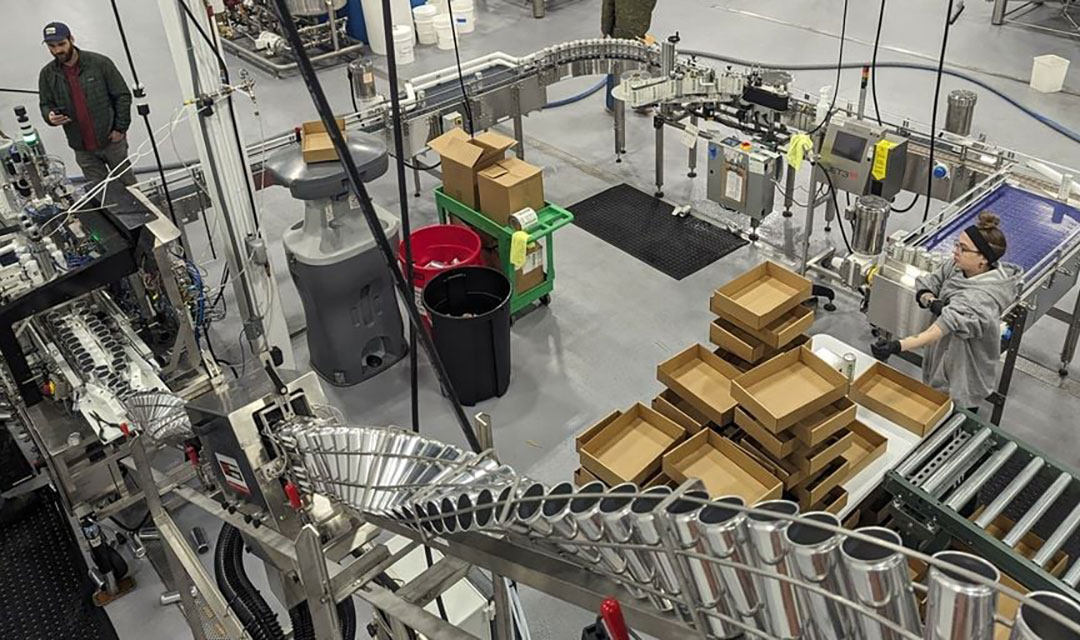Business
Michigan’s largest cannabis company looks to tap hemp-derived THC market
Published
7 months agoon


This article was reprinted with permission from Crain’s Detroit Business.
As oversupply hammers prices and the industry remains walled off from other states’ markets, Michigan’s largest cannabis company is heading south to boost its bottom line.
Evart-based Lume Cannabis Co. founded a new company, Lume Hemp Co. in Florida, to capture a portion of the massive and growing national market for hemp-derived THC.
The national cannabis landscape is a complicated web of state laws and a federal loophole that’s created dual industries competing for dominance. THC derived from hemp, legal under federal rules, is rapidly proliferating across the country, even in states where recreational cannabis isn’t legal.
The 2018 Farm Bill effectively removed hemp’s designation as a controlled substance, stating that any cannabinoid derived from hemp – defined as cannabis containing less than 0.3% THC by dry weight – could be sold in the market, free of federal intervention.
Due to the rules, with enough additive ingredients, gummies and drinks could be created to offer similar psychoactive effects to traditional marijuana that’s heavily regulated in states like Michigan.
This has led to a recent boon for operators in other states – as Michigan regulates all hemp and cannabis products, regardless of the Farm Bill – who can not only federally produce THC products, but can ship them across state lines from states like Michigan that don’t allow exports of cannabis.
Oregon-based Whitney Economics projects “conservatively” that the hemp-derived cannabis market in the U.S. hit $28.4 billion in 2023, the same size as the craft beer industry, and growing exponentially.
Meanwhile, Michigan’s marijuana THC market – the nation’s strongest in marijuana sales per capita – is plateauing under intense pricing pressure.
Prices have fallen more than 28.6% since January 2024 to an average cost of $66.50 for an ounce of marijuana in the adult-use market last month. Those are the lowest prices in the country. In Oregon, the average cost of a gram of marijuana flower in January was $3.50, or about $99.22 per ounce.
While Michigan sold a record $3.29 billion in marijuana THC products last year, Whitney Economics predicts sales will drop in the coming years due to new markets in Ohio and elsewhere and the rising hemp-derived market to $2.7 billion or $2.8 billion by 2026.
That’s bad news for Michigan’s marijuana industry, which is only using 64% of its total capacity, and a missed opportunity, Lume CEO Dave Morrow said.
“We would love to launch Lume Hemp Co. in Michigan and invest those millions of dollars here and use the infrastructure we’ve already got, but we can’t,” Morrow said. “A lot of the products already being made here are Farm Bill compliant. Michigan has one of the best THC processing infrastructures in the world — high volume, high quality and low cost. Allowing Michigan companies to be able to export products that are compliant with the Farm Bill allows the industry to take the infrastructure they’ve already invested in and expand with new opportunities in like 40 states.”
Untapped markets
Lume wants access to the larger U.S. market largely to sell its popular THC drink brand Buzzn.
The company launched the seltzer drinks, which contain 7.5 mgs of marijuana THC, in April. But those drinks are regulated by the Michigan Cannabis Regulatory Agency and are prohibited for sale outside of licensed marijuana dispensaries and can’t be exported.
It sold around 1 million cans last year, Morrow said, at 38 dispensaries across the state.
Meanwhile, hemp-derived THC drinks are storming markets all over the country. They are sold at liquor stores, bars and even at grocers. Total Wine & More, for instance, sells hemp-derived THC drinks in Texas, Florida, Minnesota, California and several other states.
And major beverage producers have already jumped on board. Seattle-based Jones Soda Co. Jones launched its own hemp THC drink under the brand Mary Jones in 2022. Mary Jones recently launched in Michigan with marijuana THC drinks, licensing Mount Clemens-based Emerald Canning Partners to make and distribute those products. Emerald Canning, a joint venture between cannabis company Pleasantrees and Armada-based Blake’s Hard Cider Co., also cans Lume’s Buzzn in Michigan.
“THC beverages are going mainstream,” Morrow said. “Most of the major distributors around the country are carrying them. Total Wine has it in their stores. Publix and Winn Dixie are joining in. It can be poured (at the bar) nearly everywhere in Florida and other states. And the only thing you need is a $450 (U.S. Food and Drug Administration) license.”
For instance, Massachusetts-based competitor Cantrip distributes hemp-derived THC drinks to 39 states thanks to the Farm Bill.
Morrow believes THC drinks could make up 15% of Florida’s $20 billion alcohol market, making its first investment there a no-brainer, because Michigan’s infrastructure is off-limits.
“We’ve got a co-packer in Ohio. That’s our solution for now,” Morrow said. “But we can’t get enough volumes there or at Emerald here. If we could pack Buzzn here and ship a Farm Bill-compliant (product) out of state, those additional units would lower our cost and boost production and create more investments.”
Should I stay or should I go?
Michigan’s fuzzy rules make the hemp-derived market a nonstarter for Lume.
Whether Michigan operators – those licensed to process hemp products – can export hemp-derived THC products out of state has always been up in the air. Most operators and industry attorneys believe it’s not legal. But the CRA confirmed to Crain’s it is legal, as long as rules are followed.
Nothing in Michigan law prevents licensed processor-handlers from shipping industrial hemp – with a THC content less than 0.3% on a dry weight basis – out of state, David Harns, spokesperson for the CRA wrote in an emailed statement to Crain’s. “Cannabis with THC content greater than 0.3% on a dry weight basis is considered marijuana under state law and is regulated under MRTMA. We don’t speak to federal law.”
But it’s more complicated than that.
The CRA is in charge of regulating marijuana food products, such as Lume’s Buzzn drinks and edibles. Hemp products are regulated by the Michigan Department of Agricultural Development, which has stricter food rules.
And the CRA’s proposed rule changes would also further restrict the ability for Lume and others to enter the hemp-derived market.
The proposed rules, which are not yet finalized, would restrict THC in hemp products to 1.75 mg per serving and 10 mg per package, well below the state’s regulated marijuana THC limits of 200 mg per package.
State regulators are caught between trying to halt hemp-derived products to protect Michigan’s $3.3 billion regulated marijuana industry, and those in the industry, like Lume, who think the cat is out of the bag and want into that business, too.
Colorado regulators threw in the towel on excluding hemp-derived products in late 2023 as the state was also suffering from oversupply and plummeting marijuana prices. Colorado created the Safe Harbor Hemp Manufacturer program, allowing the industry to produce hemp-derived THC products for export only. This move allowed for manufacturers to participate in the growing hemp-derived market across the U.S. while protecting the marijuana industry from that industry growing production in the state.
“One goal of this program was to protect Colorado’s established medical and adult-use marijuana markets by restricting the in-state sale of high-potency hemp-derived products,” Genevieve Meehan, director of regulatory compliance for Denver-based cannabis law firm Vicente, told Crain’s. “However, it may still be too early to assess its full impact. I believe the Colorado businesses expanding into hemp operations are doing so primarily for export, aiming to establish market share and brand recognition in states without regulated marijuana programs.”
Michigan could, likely, create rules to aid the industry with oversupply, hoping the state’s marijuana cultivators and processors would dedicate capacity for hemp-derived exports.
Whitney predicts that if Michigan growers reduced their plant totals to the lowest levels of their licenses, there would still be excessive oversupply.
Licenses have ranges in Michigan. For example, a Class C grow license is 501-2,000 plants. So if a grower with three Class C licenses reduced its plant total to 1,503, for instance.
Even if the thousands of growers across the state scrapped tens of thousands of marijuana plants, Michigan would still produce 3 million more pounds of marijuana than is needed to supply the entire legal market and the illicit black market in the state combined, according to Whitney.
“We can either leverage our operations in Michigan or spend that money out of state,” Morrow said. “Right now, we can’t leverage the $250 million we’ve spent here.”
But in Colorado, those marijuana investments can’t exactly be leveraged, either. Its safe harbor rules prohibit marijuana and hemp-derived locations from being located at the same facility to prevent marijuana processors from using hemp-derived to supplement product.
For the … kids
Legislators in Michigan are attempting to create a legal framework for intoxicating hemp-derived products, but not to benefit the legal cannabis industry.
Rep. Donovan McKinney, D-Detroit, introduced a series of bills in December designed to create a licensing framework and labeling requirements for a hemp-derived industry in Michigan.
Those bills were born out of a Detroit Police Department investigation last year of a hookah lounge on Seven Mile Road one block from Pershing High School that was selling unregulated hemp-derived products to children.
“This is a major problem in our school districts; these unregulated and dangerous products getting into the hands of kids,” McKinney told Crain’s. “To figure out how to stop these products from coming into the state, we have to regulate it first. It’s already here, so how can we do it legally and put some guardrails around it. We can’t allow this stuff to flood the schools.”
It’s unclear whether creating a legal framework in the state for in-state sales of intoxicating hemp products would prevent the products imported in. Large hemp-derived companies, such as Oklahoma-based Mood, operate advanced online retail operations. For instance, a consumer can order gummies without thousands of mgs of THC, legal under the Farm Bill, with nothing more than a shipping address and credit card number without any real age verification.
“Michigan is the world leader in compliant THC manufacturing,” Morrow said. “We’re in a position to clean up that industry and boost safety across the country.”

Author: mscannabiz.com
MScannaBIZ for all you Mississippi Cannabis News and Information.
You may like
-


Can LSD Battle Anxiety? The Answer Is Yes, According to Science
-


Six hurt in shooting at marijuana event in SF's Bayview
-


Kentucky Medical Marijuana Dispensaries Should Be Stocked With Products Ready For Sale By Next Month, Top State Official Says
-


Deputies: 3,500 child sex abuse images, marijuana grow operation found in NC home raid
-


Regulators Ready to Enforce Cannabis Laws on Hemp THC Retailers in Maryland
-


California reaps over $250 million from 2nd Quarter cannabis sales
Business
Nebraska medical cannabis regulations stall in legislative committee
Published
5 months agoon
April 18, 2025

A Nebraska legislative committee voted 5-3 against advancing a bill designed to implement and regulate the state’s medical cannabis program, leaving legislators and advocates searching for alternative paths forward, according to the Nebraska Examiner.
The General Affairs Committee rejected Legislative Bill 677, sponsored by State Sen. Ben Hansen of Blair, during a Thursday vote where committee members declined to offer amendments to the legislation, the publication reported.
“I don’t want to shut all the doors right now, but some doors are closing, and they’re closing fast, and so we have to act,” Hansen told reporters after the vote, according to the Examiner.
Nebraska voters approved medical cannabis in November 2024, with residents legally permitted to possess up to 5 ounces with a healthcare practitioner’s recommendation since mid-December. However, the regulatory commission created by the ballot initiative lacks effective power and funding to regulate the industry.
Hansen described his legislation as “a must” for 2025 to prevent a “Wild West” scenario in the state’s cannabis market. The bill would have expanded regulatory structure through the Nebraska Medical Cannabis Commission and extended deadlines for regulations and licensing to allow more time for implementation, the Examiner noted.
Committee disagreements centered on proposed restrictions. A committee amendment would have prohibited smoking cannabis and the sale of flower or bud products while limiting qualified healthcare practitioners to physicians, osteopathic physicians, physician assistants or nurse practitioners who had treated patients for at least six months.
The amendment also would have limited qualifying conditions to 15 specific ailments including cancer, epilepsy, HIV/AIDS, and chronic pain lasting longer than six months.
State Sen. Bob Andersen of Sarpy County opposed allowing vaping due to concerns about youth drug use, while committee chair Rick Holdcroft suggested selling cannabis flower would be “a gateway toward recreational marijuana,” a claim Hansen “heavily disputed,” according to the Examiner.
Hansen now faces a difficult path forward, requiring at least 25 votes to pull the bill from committee and then needing 33 senators to advance it across three rounds of debate, regardless of filibuster attempts.
Crista Eggers, executive director of Nebraskans for Medical Marijuana, remained optimistic despite the setback.
“This will not be the end,” Eggers said, according to the outlet. “Giving up has never been an option. Being silenced has never been an option. It’s not over. It’s not done.”
The legislative impasse is further complicated by ongoing litigation. Former state senator John Kuehn has filed two lawsuits challenging the voter-approved provisions, with one appeal pending before the Nebraska Supreme Court. The state’s Attorney General is also trying to do something about the hemp question, akin to other states across the country.

Author: mscannabiz.com
MScannaBIZ for all you Mississippi Cannabis News and Information.
Business
One of Las Vegas’ cannabis lounges closes its doors
Published
5 months agoon
April 18, 2025

Nevada’s cannabis lounge experiment faces some expected growing pains, with one of just two state-licensed venues closing its doors after barely a year in business, according to the Las Vegas Weekly.
“The regulatory framework, compliance costs and product limitations just don’t support a sustainable business model,” said Thrive Cannabis managing partner Mitch Britten, who plans to convert the space into an event venue until regulations loosen up.
The closure leaves Planet 13’s Dazed Consumption Lounge as the only operational state-regulated cannabis lounge in Nevada. Dazed manager Blake Anderson estimates the venue attracts around 250 customers daily, primarily tourists. One other establishment, Sky High Lounge, has operated since 2019 on sovereign Las Vegas Paiute Tribe land exempt from state regulations.
Even with Nevada regulators conditionally approving 21 more lounge licenses, potential owners are struggling to meet the $200,000 liquid assets requirement – particularly social equity applicants from communities hit hardest by prohibition.
Recreational marijuana has been legal statewide since 2017, but public consumption remains prohibited. That’s created an obvious disconnect for the millions of tourists who visit Las Vegas annually but have nowhere legal to use the products they purchase. The state recorded roughly $829 million in taxable sales during the 2024 fiscal year.
“It always comes down to money, and it’s difficult to get a space if you can’t afford to buy a building. On top of that, getting insurance and finding a landowner who’s willing to lease to a cannabis business is a challenge in and of itself,” said Christopher LaPorte, whose consulting firm Reset Las Vegas helped launch Smoke and Mirrors, told Las Vegas Weekly.
Many think the key to future success lies in legislative changes that would allow lounges to integrate with food service and entertainment – playing to Las Vegas’s strengths as a hospitality innovator. In the meantime, the industry will continue to adapt and push forward.
“Things take time,” LaPorte said. “There’s a culture that we have to continue to embrace and a lot of education that we still have to do. But at the end of the day, tourists need a place to smoke, and that’s what these places are.”

Author: mscannabiz.com
MScannaBIZ for all you Mississippi Cannabis News and Information.


Psyence Group Inc. (CSE: PSYG) told investors that it will be consolidating all of its issued and outstanding share capital on the basis of every 15 existing common shares into one new common share effective April 23, 2025 with a record date of April 23, 2025. As a result of the consolidation, the issued and outstanding shares will be reduced to approximately 9,387,695 on the effective date.
This is the second time a Psyence company has consolidated shares recently. In November, its Nasdaq-listed associate, Psyence Biomedical Ltd. (Nasdaq: PBM), implemented a 1-for-75 share consolidation as the psychedelics company worked to maintain its Nasdaq listing.
Psyence Group reported earnings in February when the company delivered a net loss of C$3 million and was reporting as a going concern. At the end of 2024, the company said it had not yet achieved profitable operations, has accumulated losses of C$48,982,320 since its inception.
Total assets at the end of 2024 were C$11,944,478 and comprised predominantly of: cash and cash equivalents of C$10,611,113, other receivables of C$159,808, investment in PsyLabs of C$1,071,981 and prepaids of C$68,243.
Still, the company is pushing ahead. Psyence told investors that it has historically secured financing through share issuances and convertible debentures, and it continues to explore funding opportunities to support its operations and strategic initiatives. “Based on these actions and
management’s expectations regarding future funding and operational developments, the company believes it will have sufficient resources to meet its obligations as they become due for at least the next twelve months,” it said in its last financial filing.
The company said it believes that the consolidation will position it with greater flexibility for the development of its business and the growth of the company.

Author: mscannabiz.com
MScannaBIZ for all you Mississippi Cannabis News and Information.

Can LSD Battle Anxiety? The Answer Is Yes, According to Science

Six hurt in shooting at marijuana event in SF's Bayview

Kentucky Medical Marijuana Dispensaries Should Be Stocked With Products Ready For Sale By Next Month, Top State Official Says

Deputies: 3,500 child sex abuse images, marijuana grow operation found in NC home raid

Regulators Ready to Enforce Cannabis Laws on Hemp THC Retailers in Maryland

California reaps over $250 million from 2nd Quarter cannabis sales

Meet the World’s First Cannabis Rugby Team: Crewmen 7’s Tackle Stigma Head-On

Texas Supreme Court Refuses To Take Up Marijuana Case Challenging State’s Rejection Of Local Decriminalization Law

California Passes Bill to Ban Intoxicating Hemp Products Outside Cannabis Market

Pending Federal Hemp Legislation Could Reshape The Legal Industry By Banning Some Products (Op-Ed)

Verano Proposes to Redomicile Parent Company From British Columbia to Nevada

8,000 cannabis plants seized from illegal Bradford grow-op

New York Lawmakers Schedule Psychedelics-Focused Hearing To Discuss ‘Medicinal Value And Risks’ Of Psilocybin

Curaleaf Opens Cannabis Dispensaries in Florida, Ohio

How to Protect Your Outdoor Cannabis Crops From Pests

Feds provide anti-cannabis group a platform to bash legalization (Newsletter: September 15, 2025)

Dozen arrested after south Mississippi bust for illegal sales to underage customers

The Toking Traveler: Why Amsterdam Weed Is Mostly Boof

Arkansas Medical Marijuana Sales Are On Track To Set A New Annual Record

When Cannabis Brands Blur Into Youth Culture, Regulators Notice: Lessons From Tobacco’s Past

Rhode Island Marijuana Dispensary License Application Process Officially Launches

Middle school student found with cannabis in bookbag, Charles County deputies say

Smugglers who brought drugs on an industrial scale into Wales jailed

Attorney pulls out bag of cannabis in NC Supreme Court hearing

Alert: Department of Cannabis Control updates data dashboards with full data for 2023

Connecticut Appoints The US’s First Cannabis Ombudsperson – Yes there is a pun in there and I’m Sure Erin Kirk Is Going To Hear It More Than Once!

5 best CBD creams of 2024 by Leafly

EU initiative begins bid to open access to psychedelic therapies
New Study Analyzes the Effects of THCV, CBD on Weight Loss

Free delta-9 gummies from Bay Smokes

Discover New York’s dankest cannabis brands [September 2024]

5 best autoflower seed banks of 2024 by Leafly

Press Release: CANNRA Calls for Farm Bill to Clarify Existing State Authority to Regulate Hemp Products

Curaleaf Start Process Of Getting Their Claws Into The UK’s National Health System – With Former MP (Resigned Today 30/5/24) As The Front Man

May 2024 Leafly HighLight: Pink Runtz strain

Local medical cannabis dispensary reacts to MSDH pulling Rapid Analytics License – WLBT

Recreational cannabis on ballot for third time in South Dakota

5 best THC drinks of 2024 by Leafly

Horn Lake denies cannabis dispensary request to allow sale of drug paraphernalia and Sunday sales | News

Mississippi city official pleads guilty to selling fake CBD products

6 best CBD gummies of 2024 by Leafly

Nevada CCB to Accept Applications for Cannabis Establishments in White Pine County – “Only one cultivation and one production license will be awarded in White Pine County”

The Daily Hit: October 2, 2024

5 best delta-9 THC gummies of 2024 by Leafly

Weekly Update: Monday, May 13, 2024 including, New Guide for Renewals & May Board meeting application deadline

PRESS RELEASE : Justice Department Submits Proposed Regulation to Reschedule Marijuana

5 best THCA flower of 2024 by Leafly

People In This State Googled ‘Medical Marijuana’ The Most, Study Shows
Trending
-

 California Cannabis Updates1 year ago
California Cannabis Updates1 year agoAlert: Department of Cannabis Control updates data dashboards with full data for 2023
-

 Breaking News1 year ago
Breaking News1 year agoConnecticut Appoints The US’s First Cannabis Ombudsperson – Yes there is a pun in there and I’m Sure Erin Kirk Is Going To Hear It More Than Once!
-

 best list1 year ago
best list1 year ago5 best CBD creams of 2024 by Leafly
-

 Business12 months ago
Business12 months agoEU initiative begins bid to open access to psychedelic therapies
-

 cbd1 year ago
cbd1 year agoNew Study Analyzes the Effects of THCV, CBD on Weight Loss
-

 Bay Smokes1 year ago
Bay Smokes1 year agoFree delta-9 gummies from Bay Smokes
-

 autoflower seeds12 months ago
autoflower seeds12 months ago5 best autoflower seed banks of 2024 by Leafly
-

 cannabis brands12 months ago
cannabis brands12 months agoDiscover New York’s dankest cannabis brands [September 2024]
